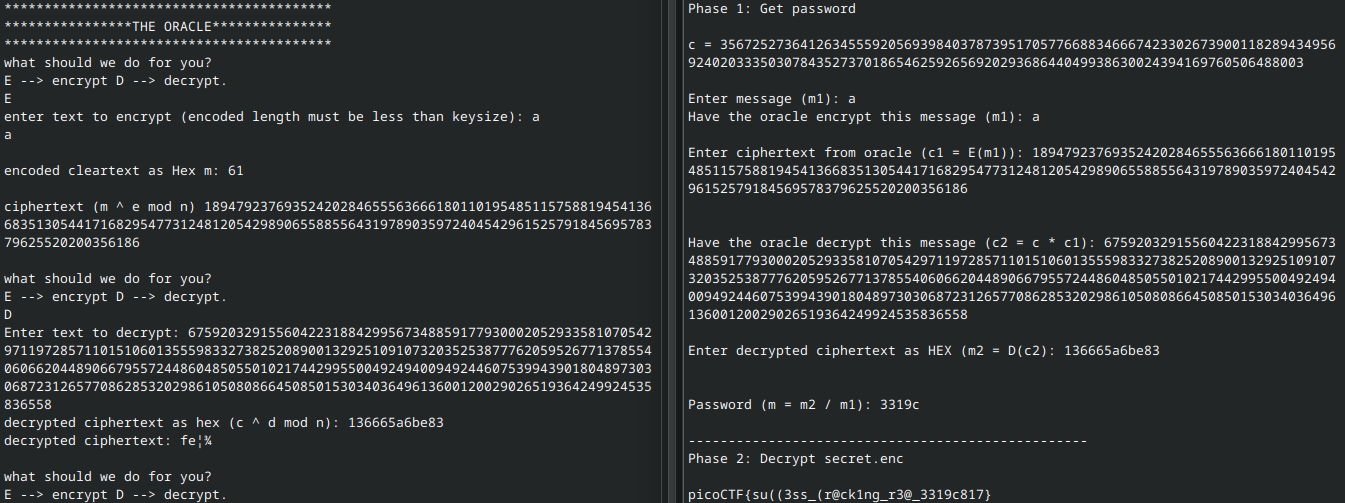Problem

Solution
Given two files, secret.enc and password.enc (the ciphertext and encrypted password, respectively), we must first reveal the password as plaintext, then use this to decrypt the ciphertext. The contents of the files are as follows:
secret.enc
Salted__u·ØoÁ3aÿõð &
w�¥^áó&gº·h¦Úaõ/¨§^
J\)æ§ge0"_G
password.enc
3567252736412634555920569398403787395170577668834666742330267390011828943495692402033350307843527370186546259265692029368644049938630024394169760506488003
Background
A few semesters ago I took a cryptography course which dealt with problems similar to this (albeit, mostly theoretical in nature).
Assuming the oracle uses textbook RSA under the hood (which is highly plausible for a question of this sort), it is susceptible to a chosen plaintext attack by leveraging its partially-homomorphic nature. Here’s how:
7. Chosen Ciphertext Attack
Let denote for illustrative purposes.
RSA is partially-homomorphic: for two messages and ,
So, the product of two ciphertexts is equal to the encryption of the product of the respective plaintexts.
Suppose an attacker is given a ciphertext, and a decryption oracle that will decrypt anything except . If the attacker were to supply for some arbitrary integer to the oracle, it would happily decrypt since . However, since the attacker chose , they can recover by simply computing .
Link to original
This is the approach we must take to decrypt the encrypted password in password.enc. With the password in hand, we can decrypt secret.enc using openssl enc -aes-256-cbc -d -in secret.enc -pass pass:<password-goes-here>.
Below is an interactive script that I wrote to decrypt the password and with it, the secret, for any single-character message.
Script
from subprocess import run, PIPE
# Grab ciphertext
with open("password.enc", "r") as f:
c = int(f.read())
print("Phase 1: Get password\n")
print(f"c = {c}\n")
# Get message from user
m1 = input("Enter message (m1): ")
m1_bytes = bytes(m1, "utf-8")
m1_int = ord(m1_bytes)
print(f"Have the oracle encrypt this message (m1): {m1}\n")
c1 = int(input("Enter ciphertext from oracle (c1 = E(m1)): "))
print("\n")
# Exploit the homomorphic property of RSA
c2 = c * c1
print(f"Have the oracle decrypt this message (c2 = c * c1): {c2}\n")
m2 = int(input("Enter decrypted ciphertext as HEX (m2 = D(c2): "), 16)
print("\n")
# Exploit the homomorphic property of RSA some more
m_int = m2 // m1_int
m = m_int.to_bytes(len(str(m_int)), "big").decode("utf-8").lstrip("\x00")
print(f"Password (m = m2 / m1): {m}\n")
print("-" * 50)
print("Phase 2: Decrypt secret.enc\n")
# Decrypt the secret and print it
res = run(["openssl", "enc", "-aes-256-cbc", "-d", "-in", "secret.enc", "-pass",
f"pass:{m}"], stdout=PIPE, stderr=PIPE, text=True)
print(res.stdout)Running this (and playing along with the oracle) goes a little something like this:

Reflection
While this script does the job, it’s a bit ugly and cumbersome. Going forward, I’ll be trying Pwntools to make things a bit nicer